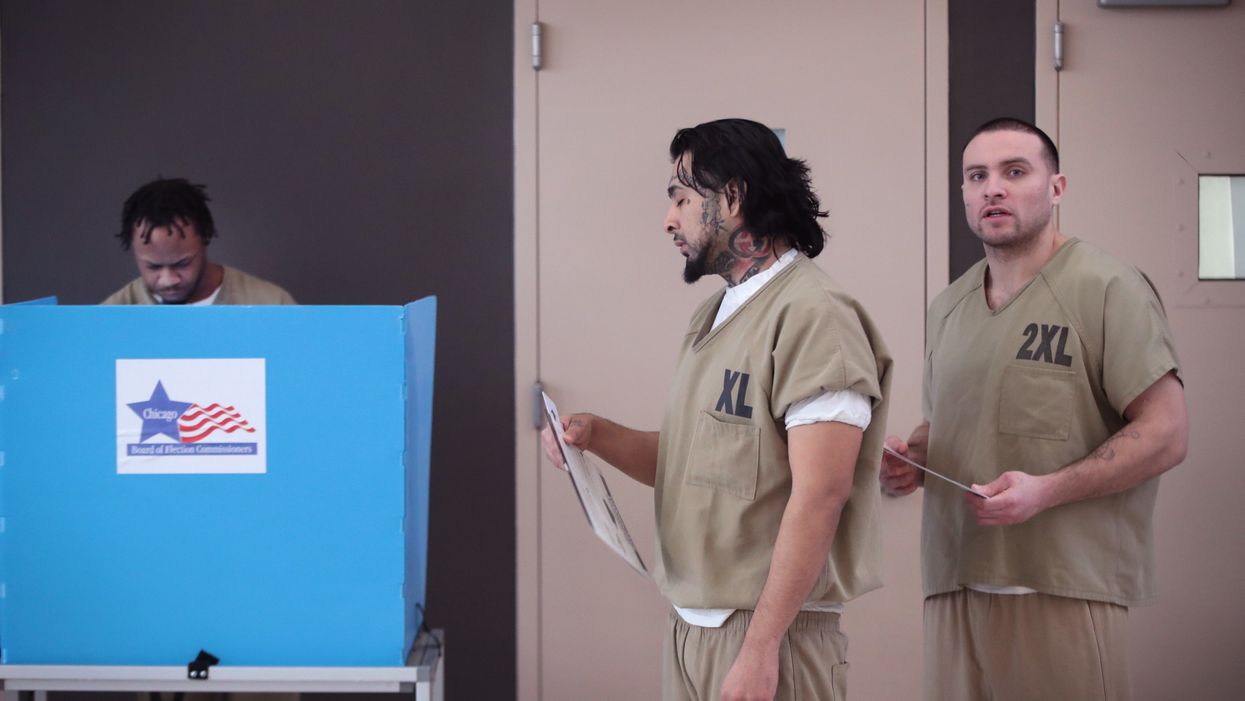The vast majority of states allow those serving misdemeanor sentences in jails to vote. And the Supreme Court ruled back in 1974 that eligible voters being held in jails — those who have been arrested but not yet convicted — could not be denied their right to vote because they were incarcerated.
On any given day, the number of eligible voters locked up by cities and counties ranges from half a million to 700,000, numbers big enough to tip the outcome of close legislative or congressional contests — or even a presidential battleground state.
But in a year in which the coronavirus pandemic has made everything about elections more difficult, this particularly hard-to-reach segment of the electorate is even tougher to reach.
Recently, for example, when a voting rights group sent postcards with election registration and voting information to some incarcerated voters in Arizona for a July primary, officials confiscated the mailings with little explanation, according to Dana Paikowsky, a jail voting expert at the Campaign Legal Center, which advocates for voting rights.
Voting while incarcerated is hard, and the turnout rate among jailed voters is already low. During a pandemic that has further cut off outside visits into jails and prisons — including, in many cases, voter registration drives — the situation has only worsened.
"Jail-based disenfranchisement is a complex system of conditions and factors and laws that make it incredibly difficult for incarcerated people to cast their ballots," Paikowsky said. "Covid-19 has exacerbated all of those problems."
Even in normal times, Paikowsky said there are a variety of hurdles incarcerated voters must overcome to cast largely absentee ballots.
Few jailed voters know they remain eligible to vote from behind bars. Neither do many officials, who Paikowsky said often don't know what obligations they have to facilitate that process. There's little oversight from the states. Nor are there many policies from jail administrators or election officials that clearly explain how to vote from the inside.
And for those jailed after their state's deadline for obtaining an absentee ballot, there may not be another way of voting. This reportedly happened to some Black Lives Matter protesters who were arrested during the wave of demonstrations early this summer, when many states were holding primaries.
"If the state doesn't provide them with an alternative means of exercising that right," Paikowsky said, "then they're just disenfranchised."
Among other solutions to combat this, jails often rely on groups such as the League of Women Voters and the NAACPto run voter registration drives.
"Those efforts are severely hampered if not entirely halted as a result of a pandemic," said Sean Morales-Doyle, senior counsel for democracy issues at the Brennan Center for Justice, a voting rights group. "You can't go into a jail to register people to vote when you've got a pandemic that hits incarcerated people particularly hard."
Both Morales-Doyle and Paikowsky said the onus to make sure jailed voters can exercise their political rights is on local election and jail officials. They say polling stations should be set up inside the lockups and election officials should work with sheriff's offices, which run most jails, to get jailed people vote-by-mail ballots in time.
"The state takes responsibility for all kinds of things for them because the person is locked up," Morales-Doyle said. "They take responsibility for their health care and their meals, and all the other things that they're constitutionally entitled to. This is another one of the things that they're constitutionally entitled to."
Morales-Doyle pointed to places such as Chicago, where a Cook County ordinance mandates more access to voting in jails, as an example of how the system can improve. The County Jail set up multiple polling centers for the primary in March. Other states have taken additional measures.
To minimize the risk of Covid-19 exposure for presidential election voters, Vermont — one of only two states, with Maine, that allows prison inmates to vote — is also among the handful of states that have decided to send all registered voters a mail-in ballot this fall. And that will include incarcerated registered voters with a prison address. Emily Tredeau, an attorney for the Vermont Prisoners' Rights Office, predicted that because the ballots will be sent out with a postage-paid return envelope, prison turnout will increase this year.
But while some jurisdictions are taking steps to make voting more accessible for pre-trial detainees during the pandemic, Morales-Doyle said many counties and states still have much work to do. He notes how the pandemic has put a spotlight on voting by mail and the hurdles that come with it — especially for people who are effectively quarantined because they're ill or have been in close contact with infected people.
"That's always been the case for people in jail that they face all those obstacles and then some," Morales-Doyle said. "We should use this renewed focus to shine a light on and pay more attention to the people who are both experiencing the brunt of the pandemic from a public health perspective and the highest obstacles when it comes to casting a ballot. Those are people who are currently in custody."
After the Arizona voting postcards were confiscated, one jailed person was connected with the Campaign Legal Center, which arranged for him to get an absentee ballot. But after the confiscation, which meant he didn't have the information from the postcard about voting, he said he felt intimidated. He didn't end up voting in the July primary.
"That situation shows, in order to even get a ballot, you might have to be an agitator," Paikowsky said. "In order to be able to use that ballot, you need access to lots of information and resources. It's something that can be incredibly difficult for people who are incarcerated."



















